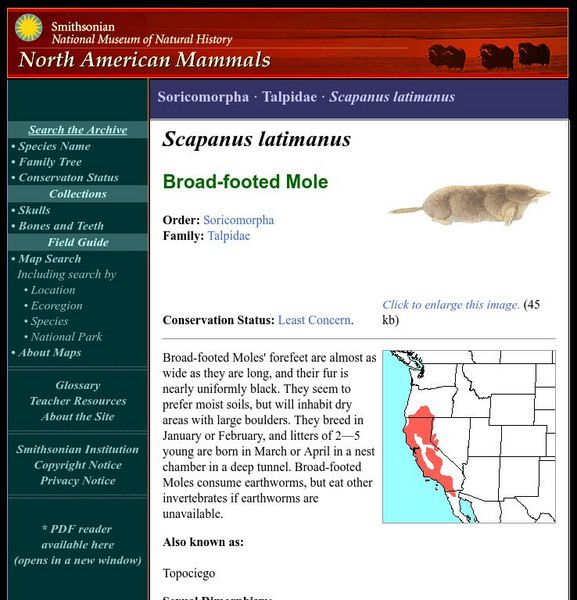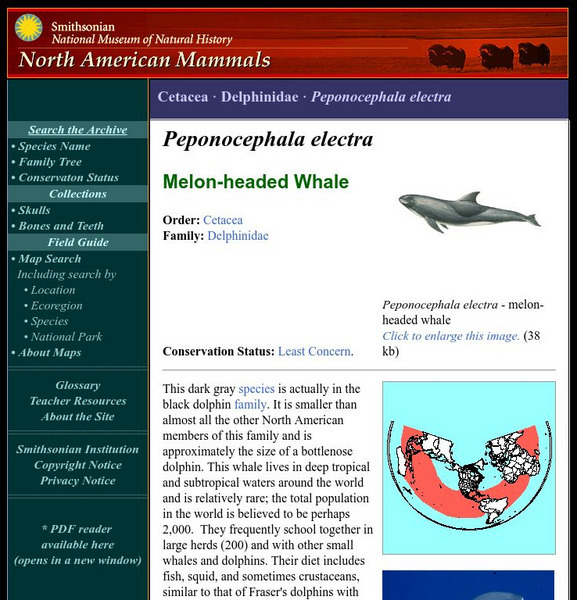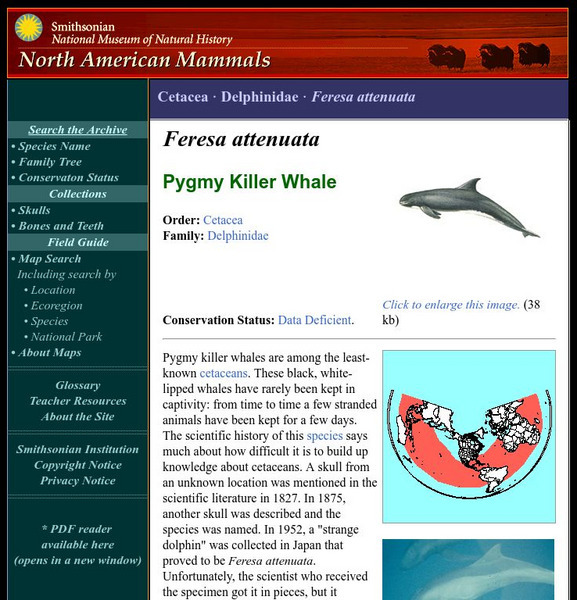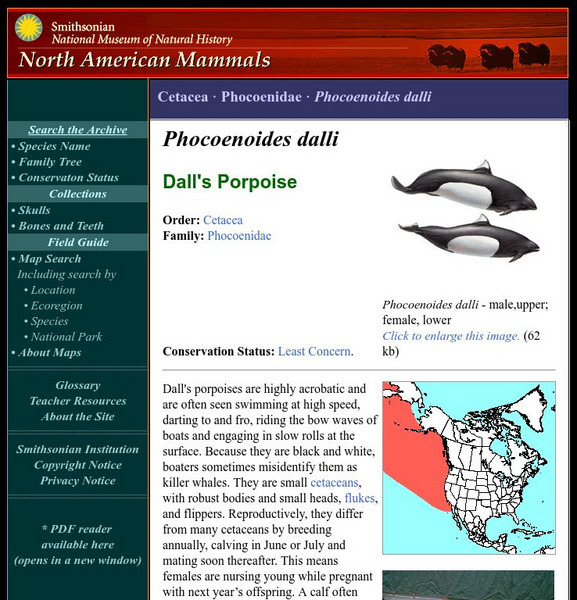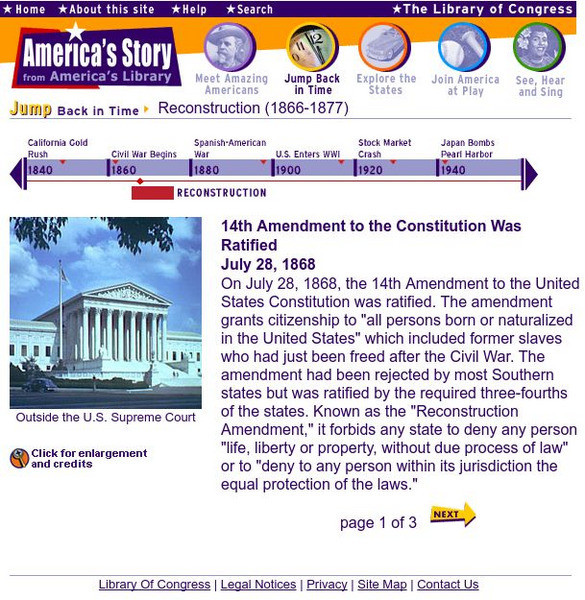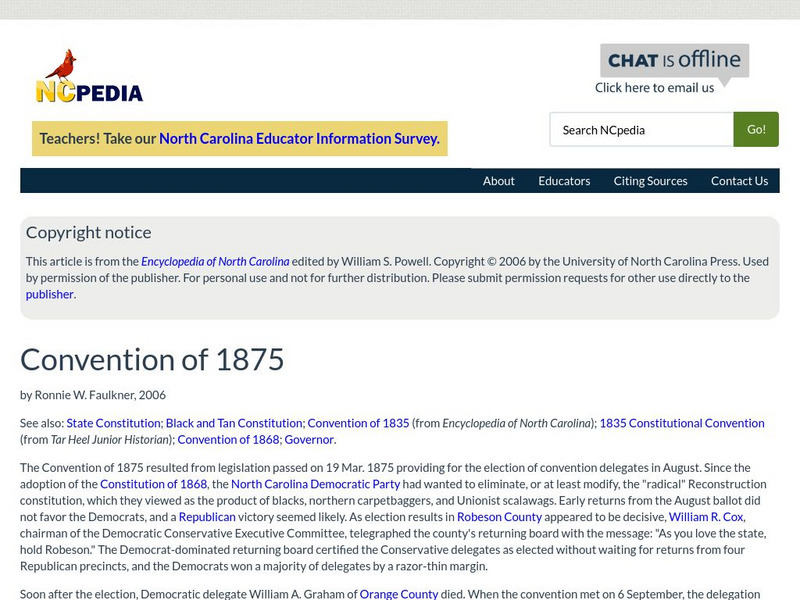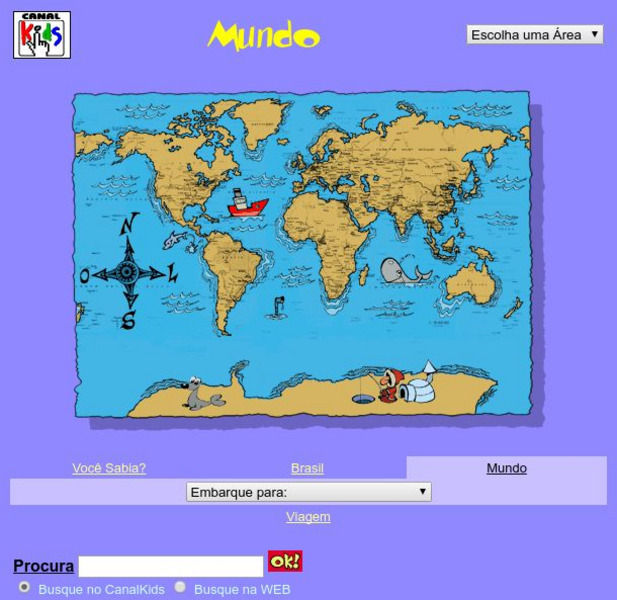Channel 4 Learning
Channel 4: We Are From Finland
Here you can learn all about the Scandinavian country of Finland. Content includes a look at Finland's history, countryside, people, seasons, and other interesting facts.
Smithsonian Institution
National Museum of Natural History: American Mammals: White Tailed Jackrabbit
White-tailed Jackrabbits live at a remarkably broad range of elevations, from 40 m to 4,300 m, and where they are in competition with Black-tailed Jackrabbits, they tend to move toward higher elevations. They are slightly larger than...
Smithsonian Institution
National Museum of Natural History: American Mammals: Plains Pocket Mouse
The color of the Plains Pocket Mouse varies with soil color. The black volcanic sands near Flagstaff, Arizona harbor mice with nearly black fur, and mice with nearly white fur match the white gypsum dunes of New Mexico. Learn more about...
Smithsonian Institution
National Museum of Natural History: American Mammals: Broad Footed Mole
Broad-footed Moles' forefeet are almost as wide as they are long, and their fur is nearly uniformly black. They seem to prefer moist soils, but will inhabit dry areas with large boulders. Learn more about the Scapanus latimanus, more...
Smithsonian Institution
National Museum of Natural History: American Mammals: Silver Haired Bat
Somewhat resembling the larger hoary bat, the silver-haired bat has frosted tips on the black or dark-brown fur of its back. Silver-haired bats occur in both grassland and forest and are abundant in old-growth forest. Learn more about...
Smithsonian Institution
National Museum of Natural History: American Mammals: Margay
Margays are small spotted cats that closely resemble ocelots, but are about half the size and lack the ocelot's two prominent black cheek stripes. Margays are forest-dwellers and good climbers and jumpers, so agile that captives have...
Smithsonian Institution
National Museum of Natural History: American Mammals: Melon Headed Whale
This dark gray species is actually in the black dolphin family. It is smaller than almost all the other North American members of this family and is approximately the size of a bottlenose dolphin. Learn more about the Peponocephala...
Smithsonian Institution
National Museum of Natural History: American Mammals: Pygmy Killer Whale
Pygmy killer whales are among the least-known cetaceans. These black, white-lipped whales have rarely been kept in captivity: from time to time a few stranded animals have been kept for a few days. Learn more about the Feresa attenuata,...
Smithsonian Institution
National Museum of Natural History: American Mammals: Dall's Porpoise
Dall's porpoises are highly acrobatic and are often seen swimming at high speed, darting to and fro, riding the bow waves of boats and engaging in slow rolls at the surface. Because they are black and white, boaters sometimes misidentify...
Smithsonian Institution
National Museum of Natural History: American Mammals: Spotted Bat
Conspicuous and distinctive, with three highly visible white spots on its black back, and larger-than-life ears for its body size, the spotted bat would doubtless be the object of more human attention if it flew during the day. As it is,...
Smithsonian Institution
National Museum of Natural History: American Mammals: Long Eared Myotis
With its long, luxurious fur, which can range in color from dark brown to pale yellow, and its large, coal-black ears, the long-eared myotis is a striking animal. Long-eared myotis prefer roosting in rock outcroppings and dead trees....
Other
Negro Baseball Leagues
This resource explains the history behind African American baseball leagues. Provides context to help visitors understand why these leagues came about and why they ended.
Ed Koday
Web Archive: Scarab Beetles
Dung, rhinoceros, Hercules, sacred scarab: These are the names of some of the most well known beetles in the scarab beetle family. This large family of more than 30,000 species has some of the most awesome beetles in the insect...
Alabama Learning Exchange
Alex: Famous African Americans
During this unit students will study the lives of famous African-Americans who have had an impact upon history or present day society. This interdisciplinary hands-on unit will incorporate the subjects of social studies, reading,...
Other
Women in History: Madame c.j. Walker
This biographical sketch from the Lakewood Public Library includes facts, accomplishments, and links to websites for further research.
Independence Hall Association
U.s. History: The Trail of Tears: The Indian Removals
The Cherokee were not the only Native Americans affected by the Indian Removal Policy. Read about the Sac and Fox Indians in Illinois, and the Seminole in Florida. In addition, read about the many attempts, including a law suit filed by...
Curated OER
National Park Service: Picturing Nonviolence or Nonexistence [Pdf]
This lesson plan teaches students about Dr. King's philosophy of nonviolence. This is a PDF document.
Library of Congress
Loc: America's Story: 14th Amendment to the Constitution
After the Civil War, the 14th amendment granted citizenship to all people born or naturalized in the United States. This included former slaves. Learn about the protections this amendment offers to citizens, including those who were once...
Library of Congress
Loc: America's Story: Ty Cobb Made His 4,000th Hit
One of the best baseball players of all time was involved in a scandal. Visit this Library of Congress site to learn more about Ty Cobb.
State Library of North Carolina
N Cpedia: Convention of 1875
The Convention of 1875 resulted from legislation passed on 19 Mar. 1875 providing for the election of convention delegates in August. Since the adoption of the Constitution of 1868, the North Carolina Democratic Party had wanted to...
ClassFlow
Class Flow: Separate but Equal
[Free Registration/Login Required] Using a thorough Glossary of Terms, students discuss the idea of being separate but equal.
Other
Canal Kids: Mundo (Natural & Historical World Wonders)
The "Mundo" area of Canal Kids highlights forty of the world's natural and historical wonders. Pick a location from the drop-down menu and get background information on the Parthenon, Mount Fuji, the Grand Canyon, the Great Wall of...
Ducksters
Ducksters: The Cold War for Kids: Red Scare
Kids learn the history of the Red Scare during the Cold War. A fear of communism caused black lists and accusations led by Senator Joseph McCarthy.
Ducksters
Ducksters: Space Science: Astronomy for Kids
Kids learn about astronomy, the study of outer space including the stars, planets, comets, black holes, and the Solar System. History and astronomers in this astronomy for teachers and kids section.
Other popular searches
- Black History Month
- Black History Month Projects
- Black History Month Math
- Black History Month Lesson
- Black History Month Art
- Black History Projects
- Black History Month Activity
- Black History Month Rap
- Black History Activities
- Black History Lessons
- Black History Month Programs
- Black History Month Music



